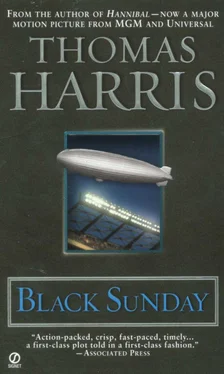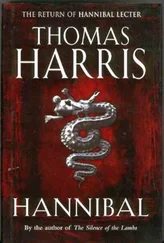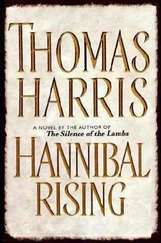He was a child of eight with impetigo on his knees, and he was standing on the bare clay playground of a country school when he looked up and saw the airship. Silver, wearing for a reach across the wind, it floated over the schoolyard, scattering in the air behind it tiny objects that floated down—Baby Ruth candy bars on small parachutes. Running after the airship, Michael could stay in its shadow the length of the schoolyard, the other children running with him, scrambling for the candy bars. Then they reached the plowed field at the edge of the schoolyard and the shadow moved away, rippling over the rows. Lander in his short pants fell in the field and tore the scabs off his knees. He got to his feet again and watched the dirigible out of sight, rivulets of blood on his shins, a candy bar and parachute clutched in his hand.
While he was lost in the story, Dahlia stretched out beside him on the bed, listening. And he came to her from the playground, with wonder and the light of that old day still in his face.
After that he became shameless. She had heard his terrible wish and had accepted it as her own. She had received him with her body. Not with withering expectations, but with abundant grace. She saw no ugliness in him. Now he felt that he could tell her anything, and he poured it out—the things that he could never tell before, even to Margaret. Especially to Margaret.
Dahlia listened with compassion and concerned interest. She never showed a trace of distaste or apprehension, though she learned to be wary of him when he was talking about certain things, for he could become angry at her suddenly for injuries that others had done to him. Dahlia needed to know Lander, and she learned him very well, better than anyone else would ever know him—including the blue-ribbon commission that investigated his final act. The investigators had to rely on their piles of documents and photographs, their witnesses stiff upon the chair. Dahlia had it from the monster’s mouth.
It is true that she learned Lander in order to use him, but who will ever listen for free? She might have done a great deal for him if her object had not been murder.
His utter frankness and her own inferences provided her with many windows on his past. Through them, she watched her weapon forged….
Willett-Lorance Consolidated School, a rural school between Willett and Lorance, South Carolina, February 2, 1941:
“Michael, Michael Lander, come up here and read your paper. I want you to pay strict attention, Buddy Ives. And you too, Junior Atkins. You two have been fiddling while Rome burns. At six-weeks tests, this class will be divided into the sheep and the goats.”
Michael has to be called twice more. He is surprisingly small walking up the aisle. Willett-Lorance has no accelerated program for exceptional children. Instead, Michael has been “skipped” ahead. He is eight years old and in the fourth grade.
Buddy Ives and Junior Atkins, both twelve, have spent the previous recess dipping a second-grader’s head in the toilet. Now they pay strict attention. To Michael. Not to his paper.
Michael knows he must pay. Standing before the class in his baggy short pants, the only pair in the room, reading in a voice barely audible, he knows he will have to pay. He hopes it will happen on the playground. He would rather be beaten than dipped.
Michael’s father is a minister and his mother is a power in the PTA. He is not a cute, appealing child. He thinks there is something terribly wrong with him. For as long as he can remember he has been filled with horrible feelings that he does not understand. He cannot yet identify rage and self loathing. He has a constant picture of himself as a prissy little boy in short pants, and he hates it. Sometimes he watches the other eight-year-olds playing cowboys in the shrubbery. On a few occasions he has tried to play, yelling “bang bang” and pointing his finger. He feels silly doing it. The others can tell he is not really a cowboy, does not believe in the game.
He wanders over to his classmates, the eleven- and twelve-year-olds. They are choosing sides to play football. He stands in the group and waits. It is not too bad to be chosen last, as long as you are chosen. He is alone between the two sides. He is not chosen. He notes which team chose last and walks over to the other team. He can see himself coming toward them. He can see his knobby knees beneath the short pants, knows they are talking about him in the huddle. They turn their backs to him. He cannot beg to play. He walks away, his face burning. There is no place on the red clay playground where he can get out of sight.
As a Southerner, Michael is deeply imprinted with the Code. A man fights when called on. A man is tough, straightforward, honorable, and strong. He can play football, he loves to hunt, and he allows no nasty talk around the ladies, although he discusses them in lewd terms among his fellows.
When you are a child, the Code without the equipment will kill you.
Michael has learned not to fight twelve-year-olds if he can help it. He is told that he is a coward. He believes it. He is articulate and has not yet learned to conceal it. He is told that he is a sissy. He believes that this must be true.
He has finished reading his paper before the class now. He knows how Junior Atkins’s breath will smell in his face. The teacher tells Michael he is a “good classroom citizen.” She does not understand why he turns his face away from her.
September 10, 1947, the football field behind Willett-Lorance Consolidated:
Michael Lander is going out for football. He is in the tenth grade and he is going out without his parents’ knowledge. He feels that he has to do it. He wants the good feeling his classmates have about the sport. He is curious about himself. The uniform makes him wonderfully anonymous. He cannot see himself when he has it on. The tenth grade is late for a boy to begin playing football, and he has much to learn. To his surprise the others are tolerant of him. After a few days of forearms and cleats, they have discovered that, though he is naive about the game, he will hit and he wants to learn from them. It is a good time for him. It lasts a week. His parents learn that he is going out for football. They hate the coach, a godless man who, it is rumored, keeps alcohol in his home. The Reverend Lander is on the school board now. The Landers drive up to the practice field in their Kaiser. Michael does not see them until he hears his name being called. His mother is approaching the sideline, walking stiff-ankled through the grass. The Reverend Lander waits in the car.
“Take off that monkey suit.”
Michael pretends not to hear. He is playing linebacker with the scrubs in scrimmage. He assumes his stance. Each blade of grass is distinct in his eyes. The tackle in front of him has a red scratch on his calf.
His mother is walking the sideline now. Now she is crossing it. She is coming. Two hundred pounds of pondered rage. “I said take off that monkey suit and get in that car.”
Michael might have saved himself in that moment. He might have yelled into his mother’s face. The coach might have saved him, had he been quicker, less afraid for his job. Michael cannot let the others see any more. He cannot be with them after this. They are looking at each other now with expressions he cannot stand. He trots toward the prefabricated building they use for a dressing room. There are snickers behind him.
The coach has to speak to the boys twice to resume the practice. “We don’t need no mama’s boys no way,” he says.
Michael moves very deliberately in the dressing room, leaving his equipment in a neat pile on the bench with his locker key on top. He feels only a dull heaviness inside, no surface anger.
Riding home in the Kaiser, he listens to a torrent of abuse. He replies that, yes, he understands how he has embarrassed his parents, that he should have thought of others. He nods solemnly when reminded that he must save his hands for the piano.
Читать дальше












